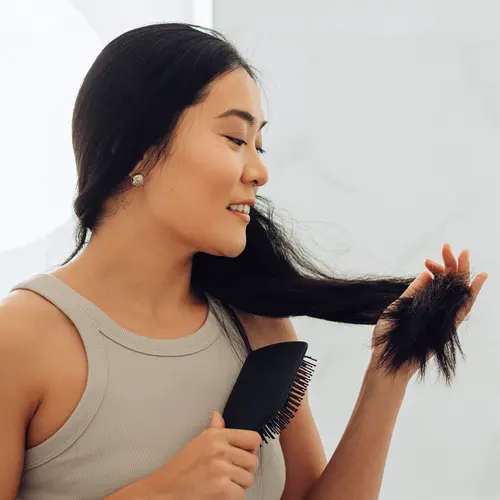When you're looking for shampoo products, you know it’s not easy to decide which one to buy. This is because they come in many types. They all contain different ingredients that promise different results. While some claim to make your hair shine, others promise hydration. Some claim to work faster in breaking up dirt and cleaning your hair.
The list of ingredients in these products is long. Some are hard to pronounce, making it difficult to understand what they do. With all the information they bombard you with, it can be challenging to know what you should or shouldn’t use on your hair.
What Ingredients Do Most Shampoos Contain?
The International Nomenclature of Cosmetic Ingredients (INCI) is the list that breaks down all the ingredients in a product. It's the first place you want to check before you buy anything to see what it contains. The FDA requires that manufacturers identify the elements they use in making shampoos with standard names across the industry. You don’t have to understand everything on the list, but this is what you’ll find included in most shampoos.
Carrying agents. They mostly appear at the beginning of the INCI list. The main job of these ingredients is to help the active ingredients in the shampoo achieve their effect. One of the most commonly used carrying agents is "aqua," which is just water.
In other shampoos, the manufacturers add alcohol as a carrying agent instead of or in addition to water. Take note that some alcohol types can make your hair dry and brittle. Propanol, ethanol, isopropyl, and propyl alcohol have this effect on your hair.
“Fatty alcohols" have a different composition and are excellent for your hair as they lock in moisture. They include cetyl alcohol, lauryl alcohol, Cetearyl alcohol, and stearyl alcohol.
Thickeners. Shampoos contain thickeners. Manufacturers do this by adding tiny flakes of the appropriate chemicals like glycol distearate. These help increase the flow of the shampoo. They don't have any adverse impacts on the health of your hair. Common shampoo thickeners are:
- Stearic acid
- Gelatin
- Xanthan gum
- Carnauba wax
- Stearyl alcohol
- Cetyl alcohol
Surfactants. Surfactants are ingredients that make shampoos effective cleaners. In other words, they're detergents that create lather, giving you the impression that your hair is getting clean. Popular surfactants you'll find listed on most shampoos include:
- Ammonium lauryl sulfate
- Sodium laureth sulfate
- Ammonium laureth sulfate
- Sodium trideceth sulfate
Surfactants are drying agents that remove all oil from your hair. If you wish to avoid sulfates, choose shampoos without sulfate alternatives. However, remember the surfactant used in replacing sulfate may be in higher quantities for the lather effect. The more soap your shampoo contains, the more the drying effect.
Preservatives. These stop mold from growing in your shampoo. Mold is a health hazard, mainly if your product contains a lot of water as an ingredient. The most commonly used preservatives are sodium benzoate and potassium sorbate, also used in food.
Parabens. are also popular preservatives in cosmetics. But some scientists think they may lead to breast cancer. That’s because they’ve found parabens in cancerous tissue and other body parts. Some parabens you might find listed on shampoo products are:
- Methylparaben
- Isopropylparaben
- Ethylparaben
- Isobutylparaben
- Butylparaben
- Propylparaben
Emollients. These are ingredients that work to balance the effects of surfactants. They help your hair follicles keep some moisture to stop your hair from becoming brittle. They also lubricate the strands of your hair to stop damaging friction. The overall effect is that your hair looks shinier and lively.
Emollients include aloe vera, vegetable oils, and mineral oils. Silicone has also become a popular emollient that seals the hair cuticle to improve shine. The most common silicone type in shampoos is dimethicone.
Which Ingredients Are Bad for Your Hair?
The ingredients in shampoos aim to give your hair instant results. However, the long-term effects can be devastating. Here are some shampoo ingredients you want to avoid:
- Sulfates: they increase skin sensitivity and strip hair of their natural oils, causing dryness
- Parabens: they increase the risk of skin cancer
- Phthalates: they are dangerous to the environment and cause hormonal disruptions
- Formaldehyde: is carcinogenic and easily absorbed by the skin
- Dimethicone: it prevents moisture from entering the hair and clogs pores over time
- Retinyl palmitate: causes itching, scaling, and peeling
- Alcohol: makes your hair dry and brittle
- Toluene: can hamper the immune system and cause congenital problems
- Imidazolidinyl: irritates the skin and eyes
How to Choose a Hair Shampoo
Consider choosing natural shampoos to avoid harmful ingredients. A shampoo is natural when it contains no sulfate and comprises plant-based or organic ingredients. Natural shampoos include:
- Essential oils, like peppermint, lemon, lavender
- Certified-organic ingredients
- Aloe
- Coconut oil
- Organic hemp
- Organic honey
- Chamomile
- Olive
- Plant oils like geranium or jojoba oil


